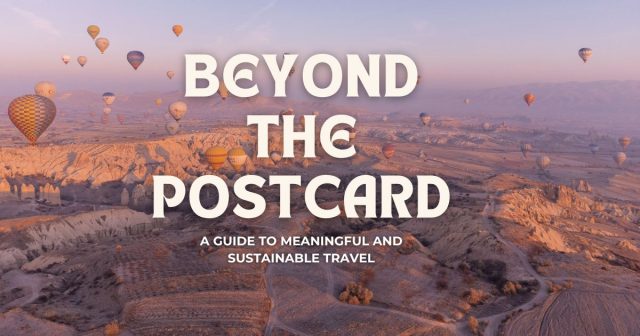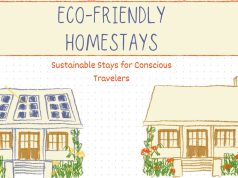The Journey That Gives Back: Redefining Adventure with Sustainable Travel
We’ve all seen them: the breathtaking photos of turquoise waters, ancient ruins piercing the clouds, and bustling cityscapes aglow with neon lights. The allure of travel is undeniable. It promises adventure, escape, and a connection to something larger than ourselves. But behind every perfect postcard image, there’s a story. Sometimes, that story includes environmental strain, cultural commodification, and economic leakage that bypasses the very communities that make a destination so special. The desire to explore our magnificent planet is a beautiful thing, but it comes with a profound responsibility.
What if your travels could do more than just provide you with memories and photos? What if they could actively contribute to the preservation of natural wonders, empower local communities, and foster genuine, respectful cultural exchange? This is the promise of sustainable travel and responsible tourism. It’s a paradigm shift from being a mere consumer of places to becoming a conscious participant in their preservation and prosperity. This guide is your roadmap to transforming your adventures into a force for good, proving that the most memorable journeys are the ones that give back.
Demystifying the Buzzwords: What Exactly Is Sustainable Travel?
The terms “sustainable,” “eco-friendly,” and “responsible” are often used interchangeably, but they represent a holistic philosophy grounded in three core pillars. Understanding these pillars is the first step toward becoming a more conscious traveler.
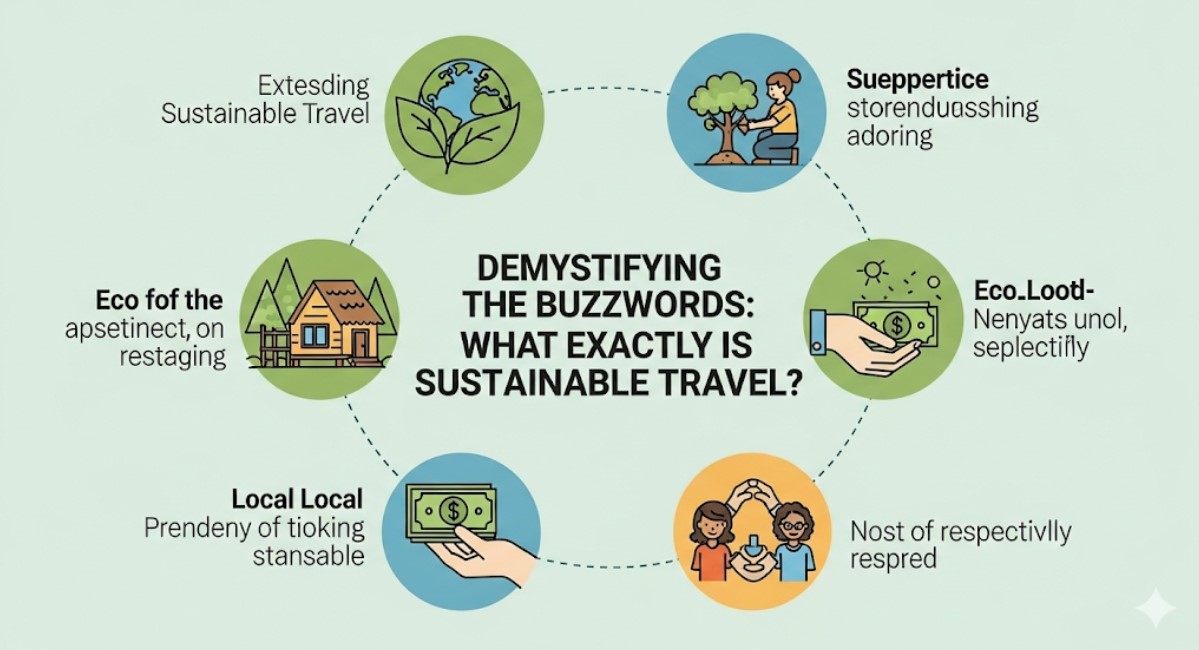
1. Environmental Sustainability: Protecting Our Planet
This is often the first thing that comes to mind. Environmental sustainability in travel focuses on minimizing your negative impact on the natural world. It’s about making choices that conserve resources, protect biodiversity, and reduce pollution. Think of it as applying the “Leave No Trace” principle on a global scale.
- Reducing Your Carbon Footprint: This involves choosing more efficient modes of transportation (like trains over short-haul flights), opting for direct flights when flying is necessary, and considering carbon offsetting programs.
- Conserving Resources: Simple acts like turning off lights and air conditioning when you leave your hotel room, taking shorter showers, and reusing towels and linens make a significant collective difference.
- Waste Reduction: Actively avoiding single-use plastics by carrying a reusable water bottle, coffee cup, and shopping bag is one of the most impactful habits you can adopt.
- Respecting Wildlife: This means observing animals from a safe and respectful distance, never feeding them, and choosing truly ethical wildlife sanctuaries over tourist traps that exploit animals for entertainment.
2. Socio-Cultural Sustainability: Honoring People and Traditions
Every destination is someone’s home. Socio-cultural sustainability is about respecting and honoring the local culture, traditions, and heritage of the communities you visit. It’s about fostering authentic and dignified interactions, ensuring that tourism doesn’t erode the very culture it seeks to experience.
- Cultural Immersion: Take the time to learn a few basic phrases in the local language. Read about local customs, etiquette, and social norms before you arrive. This small effort shows immense respect.
- Respectful Photography: Always ask for permission before taking a photo of a person, especially children. Be mindful in sacred or religious sites where photography may be inappropriate or forbidden.
- Dressing Appropriately: Research the local dress code, particularly when visiting temples, mosques, or rural villages, and dress modestly as a sign of respect.
3. Economic Sustainability: Empowering Local Economies
Where does your money go when you travel? Economic sustainability aims to ensure that the financial benefits of tourism flow directly into the local community. When your spending supports local businesses, it creates jobs, funds community projects, and gives local people a vested interest in preserving their natural and cultural heritage.
- Stay Local: Choose locally owned guesthouses, boutique hotels, or homestays over large, foreign-owned chains.
- Eat Local: Dine at family-run restaurants and street food stalls. This not only gives you a more authentic taste of the local cuisine but also directly supports local families.
- Shop Local: Buy souvenirs directly from artisans and craftspeople at local markets rather than from generic tourist shops. Pay a fair price for their work.
- Hire Local Guides: A local guide provides invaluable insight and context, and your money directly supports their livelihood and expertise.
The Conscious Traveler’s Playbook: Planning Your Sustainable Trip
A successful sustainable journey begins long before you pack your bags. Thoughtful planning is the key to minimizing your impact and maximizing your positive contribution.
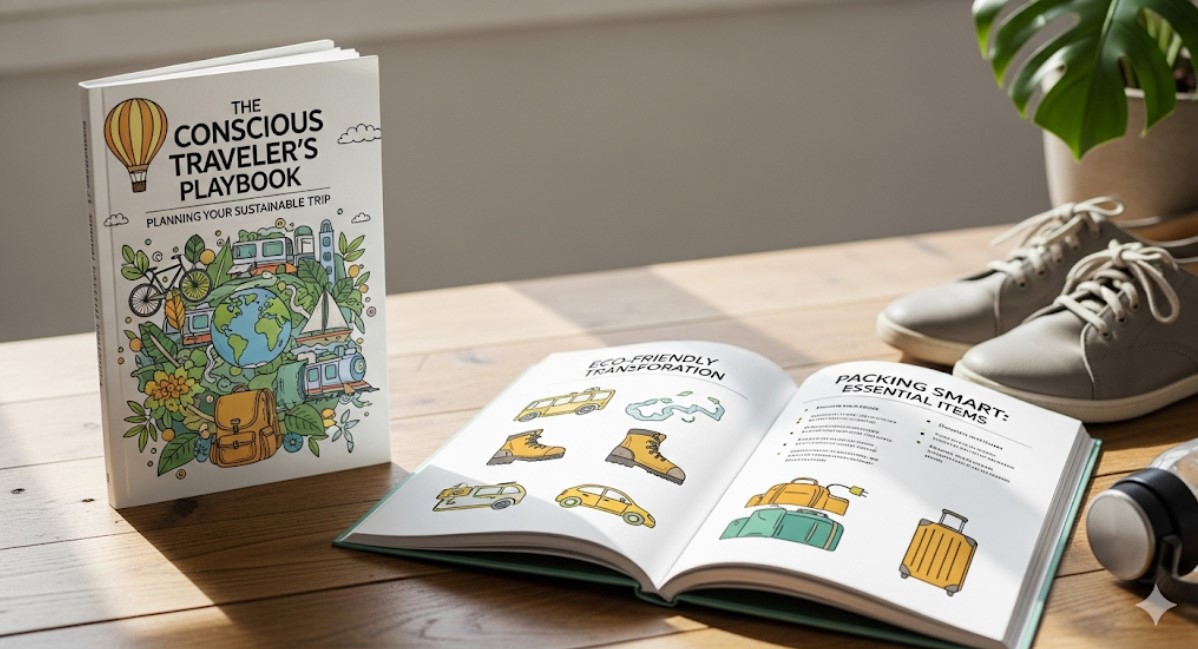
Step 1: Choose Your Destination with Intention
Instead of just picking a trending spot on Instagram, do some research. Look into issues of overtourism, where popular destinations are overwhelmed by visitors, leading to environmental damage and strain on local infrastructure. Consider traveling in the shoulder or off-season to reduce crowds and get better prices. Explore lesser-known regions or second-tier cities that would benefit more from your tourist dollars. Look for destinations or operators with recognized eco-certifications like Green Destinations or EarthCheck.
Step 2: Rethink Your Transportation
Transportation is one of the largest contributors to a trip’s carbon footprint. While flying is often unavoidable for long distances, you can still make smarter choices.
- Embrace Slow Travel: Instead of hopping between countries every few days, consider exploring one country or region more deeply. This reduces travel emissions and allows for a more meaningful connection to the place.
- Prioritize Ground Transport: Trains and buses have a significantly lower carbon footprint per passenger than planes. Overnight trains can save you a night’s accommodation cost and are an adventure in themselves.
- Fly Smarter: If you must fly, choose direct flights as take-offs and landings consume the most fuel. Pack light, as a heavier plane burns more fuel. Some travelers choose to purchase carbon offsets from reputable providers to compensate for their flight emissions.
Step 3: Pack with Purpose
Your packing list is a powerful tool for sustainability. What you bring with you can dramatically reduce your waste and environmental impact on the ground.
- The Reusables Trio: Never leave home without a reusable water bottle (with a filter if needed), a reusable coffee cup, and a foldable shopping bag. This simple kit can eliminate dozens of single-use plastic items from your trip.
- Solid Toiletries: Shampoo bars, conditioner bars, and solid toothpaste reduce plastic packaging and are less likely to leak in your luggage.
- Reef-Safe Sunscreen: If you plan on swimming in the ocean, use mineral-based sunscreens (with zinc oxide or titanium dioxide) that don’t contain oxybenzone and octinoxate, chemicals known to damage coral reefs.
- A Travel Utensil Set: A lightweight bamboo or metal fork, spoon, and straw can come in handy for street food and takeaways, avoiding plastic cutlery.
On The Ground: Putting Responsible Tourism into Practice
Once you’ve arrived, your daily choices shape the impact of your visit. This is where your commitment to sustainable travel truly comes to life.
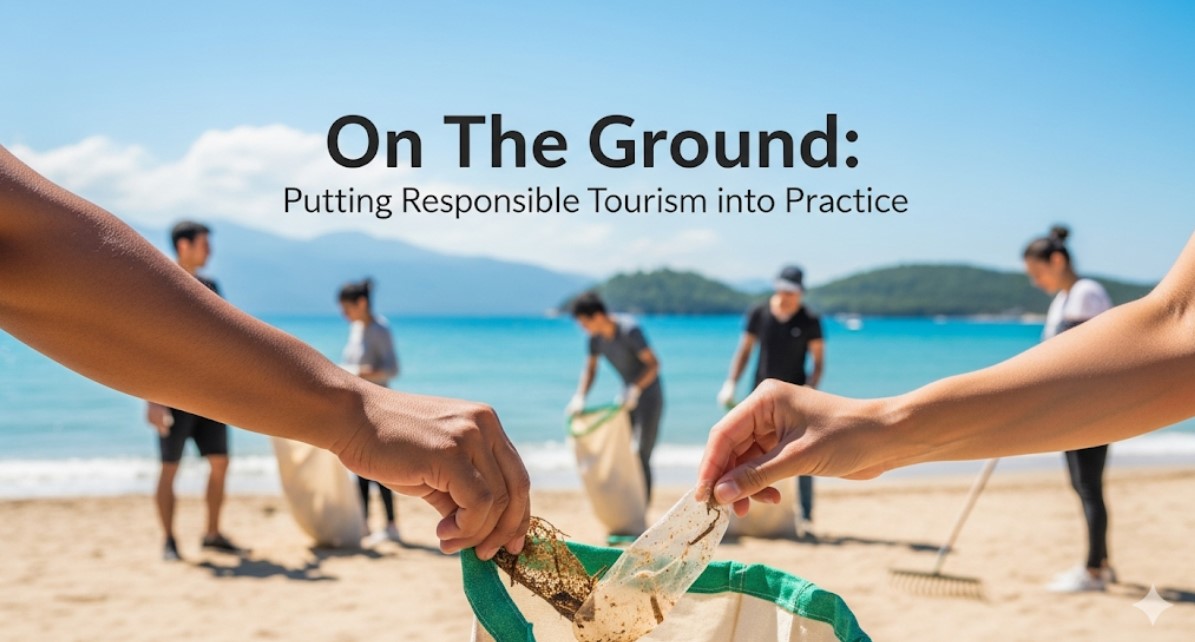
Live Like a Local (Temporarily)
Move beyond the tourist bubble. Use public transportation. Get lost in a neighborhood. Ask for recommendations from the owner of your guesthouse. By showing a genuine interest in the local way of life, you foster better connections and gain a richer, more authentic experience. When you eat at a small, family-owned restaurant, you’re not just having a meal; you’re supporting a family’s dream and tasting food made with generations of love and tradition.
Be a Champion for Ethical Wildlife Tourism
Encounters with wildlife can be a highlight of any trip, but they must be done ethically. A simple rule of thumb: if you can ride, hug, or take a selfie with a wild animal, it’s likely an unethical practice. These activities often involve animal cruelty behind the scenes. Instead, seek out experiences that prioritize animal welfare. Look for accredited sanctuaries that focus on rehabilitation and conservation, or go on safaris and tours with reputable guides who adhere to strict wildlife viewing protocols, keeping a safe distance and never disrupting the animals’ natural behaviors.
The Power of “No”
Being a responsible traveler also means knowing when to say no. Say no to plastic straws in your drink. Politely decline a plastic bag for a small purchase. Say no to buying souvenirs made from endangered species, coral, or other threatened natural materials. Say no to tours that exploit or disrespect local communities, such as those that visit indigenous villages in an intrusive, “human zoo” manner. Your refusal sends a powerful market signal that these practices are not acceptable.
The Journey Home: Your Adventure Doesn’t End at the Airport
The impact of a sustainable trip lingers long after you’ve unpacked. The perspectives you gain and the lessons you learn can inspire lasting change in your own life and in the lives of those around you.
Share your experiences, but do so mindfully. Instead of just posting a flawless selfie, tell the story of the local artisan you met or the amazing meal you had at a community-run cafe. Use your platform to promote the sustainable businesses you supported. Continue the habits you adopted on the road—reducing waste, conserving water, and shopping locally—in your daily life at home.
Travel, at its best, is a bridge. It connects us to new cultures, new landscapes, and new ideas. By embracing the principles of sustainable and responsible tourism, we ensure that this bridge is built on a foundation of respect, preservation, and mutual benefit. We transform ourselves from passive observers into active partners in protecting the planet we so love to explore. So, for your next adventure, look beyond the postcard. Plan a journey that not only enriches your soul but also leaves the world a little better than you found it.


